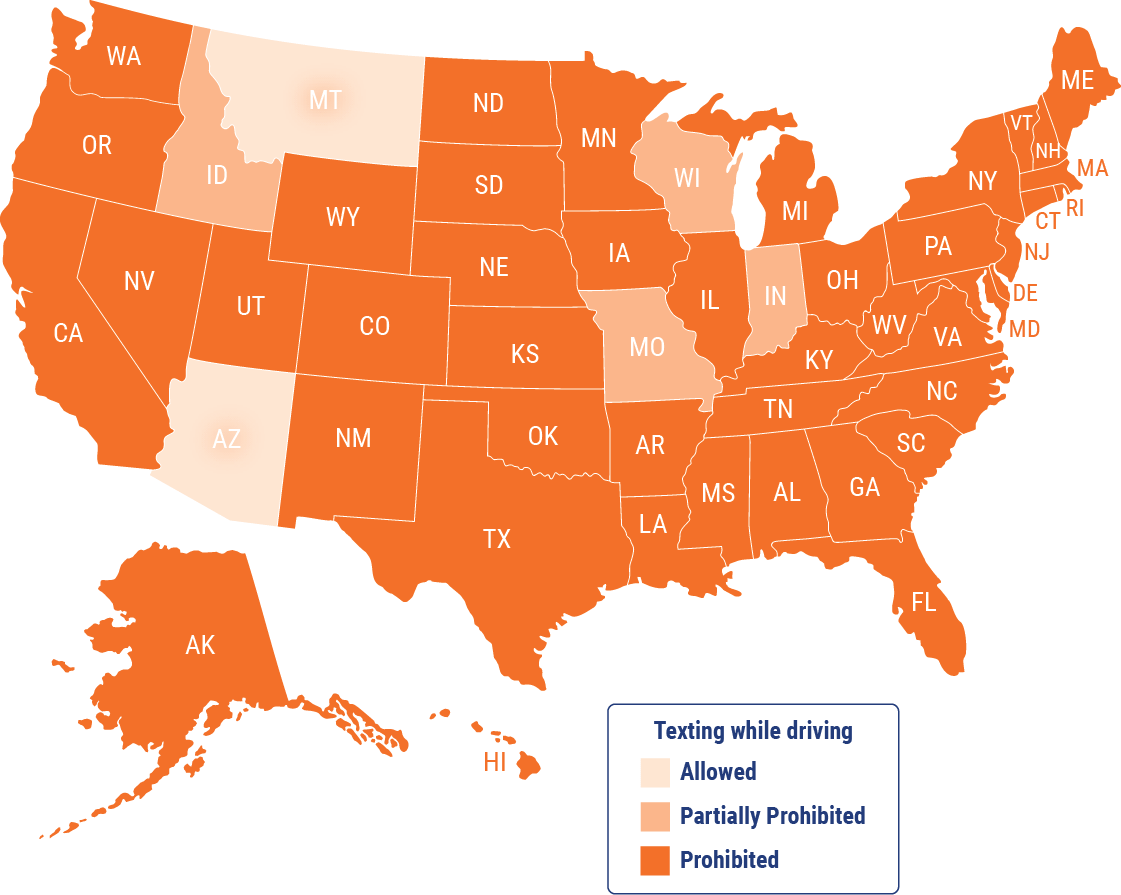Alaska Distracted Driving
(It's more than just not texting.)

In Alaska, most vehicle accidents are the result of driver error and are fully preventable. One of the most important things you can do as a driver in Alaska is to keep your attention focused on the task of driving so that you do not become distracted.
What Is Distracted Driving?
Distracted driving is any activity that takes a driver’s attention off the task of driving. It can include everything from arguing with another passenger to adjusting temperature controls.
For the purpose of the law, the state of Alaska defines distracted driving as “reading, sending, or receiving a text message from a cell phone or any other text-messaging-enabled device.” This includes messages received using a smart watch.
Distracted driving can pull a driver’s eyes and attention off the road for several seconds at a time, and this greatly increases the risk of a collision.
Distracted Driving Statistics in Alaska
- Alaska has some of the harshest distracted driving penalties in the country.
- Texting while driving was made illegal in this state in 2012.
- The National Safety Council estimates that 26% of all traffic accidents involve cell phone use.
Alaska fine cost for distracted driving

Alaska takes their distracted driving laws very seriously, and if you are caught, the fine is substantially higher than most of the nation.
Does Alaska Have Laws against Distracted Driving?
Yes.
Currently, the state of Alaska prohibits:
- Reading or typing messages on an electronic device while the vehicle is in motion
- Operating a vehicle while any screen devices, such as a television, tablet, or computer, are in full view of the driver in a normal, seated position.
These laws pertain to the use of devices only when the vehicle is in motion. It is currently legal to send and receive text messages while at a red light or stopped in traffic.
Additionally, starting in 2018, the state allows individual municipalities to control portable electronic use when driving near schools.
Are There any Exceptions to the Distracted Driving Laws in Alaska?
Yes.
Alaska’s distracted driving laws allow the use and viewing of:
- Electronic devices for voice communications, including hands-free texting
- The screens on the vehicle’s built-in audio equipment and controls
- GPS and other navigation systems
- Screen displays that enhance or supplement the driver’s view (such as reverse cameras)
- Screens displays that allow the driver to monitor passengers in the back seat
- Screens displaying dispatch information for passenger transportation or freight and package delivery
- Devices and equipment installed in emergency vehicles
Additionally, as individual municipalities begin to adopt their own laws related to cell phone use while driving near schools, some exceptions may be included.
Alaska Distracted Driving Laws at a Quick Glance
| Yes | No | |
| Is texting while driving legal? | X | |
| Can you send/receive texts at a red light? | X | |
| Is handheld device use permitted? | X | |
| Any special restriction for young drivers? | X | |
| Is headphone/headset use permitted? | X |
Is It Legal To Eat a Cheeseburger while Driving in Alaska?
Yes. However, it is not advisable to do so.
Distracted driving comes in many forms. From actions like texting or watching a video to less obvious distractions like searching for your sunglasses or munching on fries, anything that takes your attention away from the task of driving presents a hazard.
So what happens if a police officer in Alaska spots you eating a cheeseburger while driving down the highway? In most cases, nothing. There is no law that specifically states that you cannot eat while driving in this state.
However, actions like eating and talking on a handheld phone, though legal, significantly increase your risk of being in an accident or driving erratically, so it is better to avoid as many distractions as possible.
Unless you are really in a hurry, you’d probably be better off eating your cheeseburger indoors or while parked in the parking lot.
What Is the Difference between Primary and Secondary Enforcement of Distracted Driving Laws?
Primary enforcement of distracted driving laws means that the police can pull you over if they see you violating state distracted driving laws.
Secondary enforcement of distracted driving laws means that police can cite you for violating distracted driving laws only if you break another law while doing so.
Alaska uses primary enforcement.
This means that even if you are obeying all traffic laws and believe that you are in full control of your vehicle while doing so, if a police officer witnesses you sending a text message while driving, you can be pulled over and given a citation.
What Is the Penalty for Distracted Driving in Alaska?
If you look up the penalty for texting while driving in Alaska on the Internet, you will find several places that say it is punishable with up to a year in prison and a $10,000 fine for a first offense. However, this is no longer true.
Prior to 2016, simple texting while driving was considered a misdemeanor, and violators were subject to jury trials. As a result, very few people were ever penalized for breaking the no-texting law. Because of this, with Senate Bill 123, State Senator Kevin Meyer changed simple texting to a traffic violation.
Even with the new law, consequences for texting while driving are harsh. Currently, violators face penalties in accordance with the severity of their actions:
- Standard: For texting while driving with no injuries caused, this is a traffic violation punishable with a fine of up to $500.
- Injuries: For texting while driving and causing injuries to another, this is a Class C felony and the offending driver can be fined up to $50,000 and face up to five years in prison.
- Serious injuries: For texting while driving and causing serious injuries to another, this is a Class B felony and the offending driver can be fined up to $100,000 and face up to ten years in prison.
- Deaths: For texting while driving and causing a fatality while doing so, this is a Class A felony and the offending driver can face up to $250,000 in fines and up to 20 years in prison.
In addition to the penalties listed above, the ticketed driver will also have two demerit points added to their driving record.
Compare your state to the rest of the US when it comes to texting and driving restrictions

Every state in the US has a law that prohibits some sort of cell phone usage except Montana and Arizona. However, in 2021, newly enacted cell phone restriction laws will go into effect in Arizona.
Does Distracted Driving in Alaska Increase Insurance Rates?
A citation for distracted driving in Alaska adds two demerit points to you driving record, so your insurance company will be aware of the violation. It is therefore highly likely that a ticket for distracted driving will cause your insurance rates to increase.
Additionally, a distracted driving citation can cause you to lose your good driver discount if you have earned one, and this can make your rise in premiums even more painful.
What If I Drive into Canada?
You may be wondering about how the law affects you if you drive across the border into Canada.
Be aware that all provinces in Canada, including Yukon and the Northwest Territories, have prohibited the use of handheld cell phones. If caught in Yukon, you can face a fine of $500, while in British Columbia, you will be penalized with a fine of between $543 and $888.
Any time you drive into another state or country, you are required to comply with their laws. Claiming ignorance of the law will not get you out of a ticket, so be sure to review the laws of other states and providences before taking a car trip.
What Is Alaska Doing To Prevent Distracted Driving?
Currently, the state is relying on its texting ban and harsh penalties to limit the number of accidents that are caused by distracted driving. However, the use of handheld devices is still permitted by the state.
As more and more municipalities begin to adopt laws requiring hands-free calling in school zones, many hope that these laws will expand to more locations and eventually statewide.
